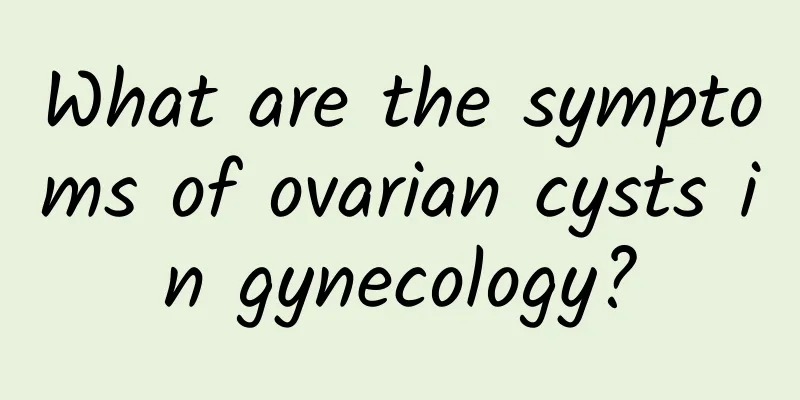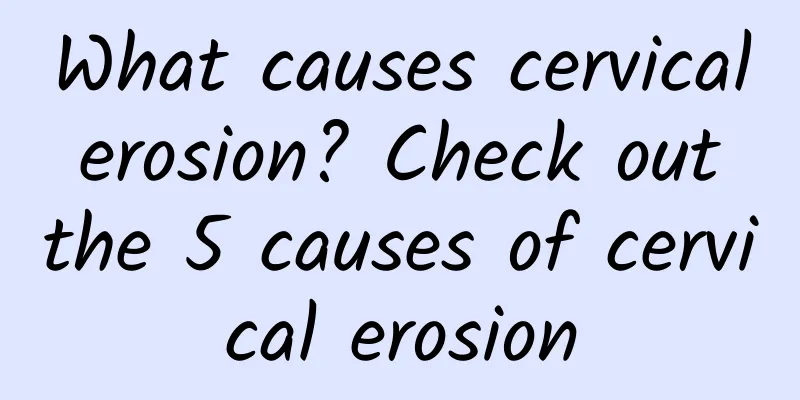What are the symptoms of ovarian cysts in gynecology?

|
What are the symptoms of gynecological ovarian cysts? What are the symptoms of ovarian cysts? Women of different ages may have different symptoms. For example, middle-aged and elderly women are prone to thickening of the waist circumference, which is called a bucket waist, while young women are prone to menstrual disorders and infertility. So what are the symptoms of gynecological ovarian cysts? Let's learn about it together. 1. Lower abdominal discomfort. Ovarian cysts can cause lower abdominal discomfort. Generally, all kinds of gynecological diseases can cause lower abdominal discomfort in women. This is the initial symptom before the patient feels a lump in the lower abdomen. Due to the weight of the tumor itself and the influence of intestinal peristalsis and body position changes, the tumor moves in the pelvic cavity, pulling on its pedicle and pelvic funnel ligament, causing the patient to feel distension and falling in the lower abdomen or iliac fossa. 2. Menstrual disorders. When women have menstruation, it is because the egg in the ovary is not fertilized and then causes menstruation. Ovarian problems will definitely affect the menstrual cycle. Generally, ovarian, or even bilateral ovarian cysts, do not cause menstrual disorders because they do not destroy all normal ovarian tissues. Some uterine bleeding is not endocrine, or it is caused by ovarian tumors that change the distribution of pelvic blood vessels, causing congestion of the endometrium; or it is caused by ovarian malignant tumors that directly metastasize to the endometrium. Menstrual disorders caused by endocrine tumors are often combined with other secretory effects. 3. Abdominal pain. Abdominal pain is a common phenomenon in patients with ovarian cysts. Generally, the symptoms are more severe if the patient has a malignant ovarian cyst. If the tumor has no complications, there is very little pain. Therefore, if patients with ovarian tumors feel abdominal pain, especially if it occurs suddenly, it is mostly caused by the torsion of the tumor pedicle, or occasionally by tumor rupture, bleeding or infection. In addition, malignant cysts often cause abdominal pain and leg pain, and the pain often causes patients to seek emergency treatment. 4. Compression. Malignant ovarian cysts can easily cause compression, which in turn causes dyspnea. Huge ovarian tumors can cause dyspnea and palpitations due to compression of the diaphragm. Ovarian tumors combined with large amounts of ascites can also cause such symptoms. However, some ovarian tumor patients have dyspnea due to unilateral or bilateral pleural effusion, and often combined with ascites. 5. Increased abdominal circumference. Malignant ovarian cysts and complex ovarian cysts may cause increased abdominal circumference and a barrel waist. This is the most common phenomenon in the main complaint. The patient finds that his clothes or belt seem tight and small, and then notices the enlargement of the abdomen, or feels it occasionally in the morning, so he presses his abdomen and finds a mass in the abdomen, plus abdominal distension and discomfort. The above is an analysis of the symptoms of gynecological ovarian cysts. I hope the above introduction can help you. Women must know more about their physical condition. Nowadays, many women suffer from various gynecological diseases, which have a huge impact on their lives. If we find the disease, we need to treat it as soon as possible to avoid delay. |
<<: What are the dietary taboos for ovarian cysts?
>>: Ovarian cyst examination method revealed
Recommend
Acute and chronic cervicitis usually manifests as leucorrhea
Acute and chronic cervicitis usually manifests as...
What are the diagnostic indicators for cervical precancerous lesions?
For diseases like cervical precancerous lesions, ...
How to prevent infection after abortion
Various infections are likely to occur after abor...
How to check for vaginal itching in women
Many women do not pay attention to personal hygie...
Analyze the causes of vaginal candidal infection
Vaginal candidiasis is a very common type of vagi...
Does hyperprolactinemia cause pain?
Will you feel pain if you have hyperprolactinemia...
What are the symptoms of bacterial vaginosis
Symptoms of bacterial vaginosis include increased...
How much does a painless abortion surgery cost?
The cost of painless abortion surgery includes su...
Tips for losing weight! Decide on dinner time first
Did you know that your body enters "body fat...
Dysmenorrhea may be caused by some endocrine factors
Dysmenorrhea may be caused by some endocrine fact...
Can dysmenorrhea cause female infertility?
When it comes to dysmenorrhea, everyone is famili...
What are the symptoms of cervical erosion in women? Introduction to the clinical manifestations of three degrees of cervical erosion
In daily life, many women suffer from cervical er...
A must-read for menopause! 6 ways to end "heartache"
Fat women get sad! According to statistics from t...
What are the symptoms of ovarian cysts?
Ovarian cyst is the most common gynecological dis...
My period came a few days earlier than usual. What should I do?
My period came a few days earlier than usual. Wha...









